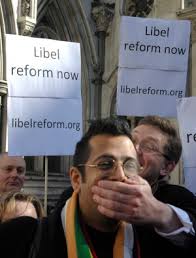 Throughout the last presidential campaign, now President Donald Trump promised to reform libel laws so that public figures could go after and win libel lawsuits against their detractors. Nothing much has come of Trump’s promises so far until today when Associate Supreme Court Justice Clarence Thomas wrote a concurring opinion and mentioned that he would support libel reform.
Throughout the last presidential campaign, now President Donald Trump promised to reform libel laws so that public figures could go after and win libel lawsuits against their detractors. Nothing much has come of Trump’s promises so far until today when Associate Supreme Court Justice Clarence Thomas wrote a concurring opinion and mentioned that he would support libel reform.
Thomas wrote, “We did not begin meddling in this area until 1964, nearly 175 years after the First Amendment was ratified,” Justice Thomas wrote of the Sullivan decision. “The states are perfectly capable of striking an acceptable balance between encouraging robust public discourse and providing a meaningful remedy for reputational harm.”
He was talking about the 1964 Supreme Court case NY Times v. Sullivan, a libel case concerning the civil rights movement. According to the NY Times, “L.B. Sullivan, a city commissioner in Montgomery, Ala., who was not mentioned in the ad, sued for libel. He won $500,000, which was at the time an enormous sum. It was one of many suits filed by Southern politicians eager to starve the civil rights movement of the oxygen of national attention. They used libel suits as a way to discourage coverage of the movement by national news organizations.
Against this background, and animated by an urge to protect the American public’s ability to assess the situation in the South for itself, the Supreme Court unanimously ruled for The Times and revolutionized American libel law.”
Thanks to the Sullivan decision, it is indeed hard for public figures to win libel suits. They have to prove that something false was said about them, that it harmed their reputation and that the writer acted with “actual malice.” That last term is misleading, as it has nothing to do with the ordinary meaning of malice in the sense of spite or ill will.
To prove actual malice under the Sullivan decision, a libel plaintiff must show that the writer knew the disputed statement was false or had acted with “reckless disregard.” That second phrase is also a term of art. The Supreme Court has said that it requires proof that the writer entertained serious doubts about the truth of the statement.
When Justice Neil Gorsuch was asked a question concerning the 1964 case he said the following, “New York Times v. Sullivan was, as you say, a landmark decision and it changed pretty dramatically the law of defamation and libel in this country,” he said. “Rather than the common law of defamation and libel, applicable normally for a long time, the Supreme Court said the First Amendment has special meaning and protection when we’re talking about the media, the press in covering public officials, public actions and indicated that a higher standard of proof was required in any defamation or libel claim. Proof of actual malice is required to state a claim.”
“That’s been the law of the land for, gosh, 50, 60 years,” he said.
While the most recent court appointments don’t appear as eager to re-consider the ruling, Thomas has a powerful ally on his side. Although deceased, Thomas’ mentor Antonin Scalia opined quite clearly on the matter. We’ll see if this one has legs. If it does, perhaps President Trump was onto something on the campaign trail when he promised libel reform.
